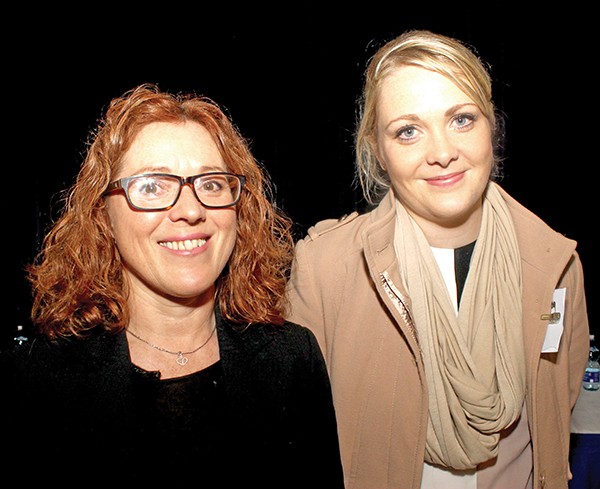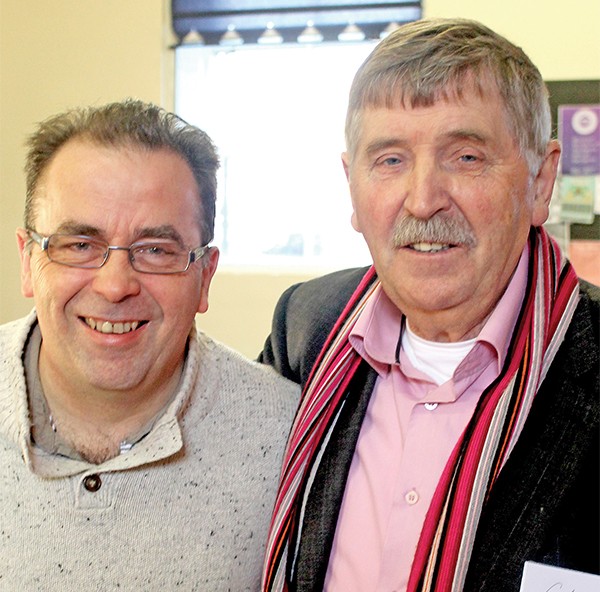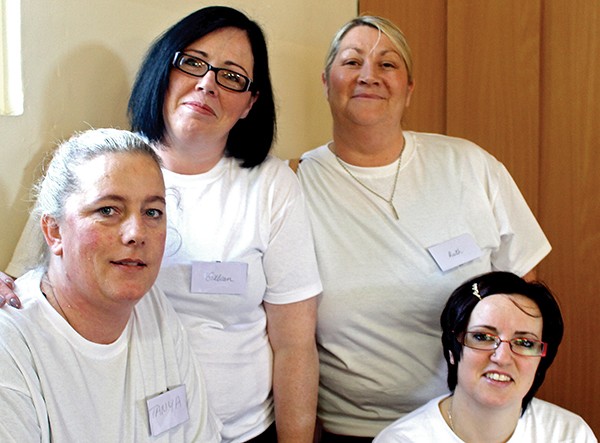
Pictured Above: Dr Carole Murphy and Amy Blake.
On Friday 27th November 2015 the South Inner City Local Drug and Alcohol Task Force hosted a conference in the St. Andrew’s Centre, Pearse Street, which brought together health service workers, addiction service users, frontline service professionals and community workers. The purpose of the conference was to explore the practice of Dual Diagnosis and to advocate for its inclusion in the new National Drugs Strategy, which will commence in January 2017.
The conference was addressed by Minister Aodhán Ó Ríordáin (Minister of State at the Department of Justice with special responsibility for Drugs), Cllr Dermot Lacey (Chairperson of the Task Force), Dr Carole Murphy (Senior Lecturer in Sociology and Criminology), Sean Foy and Liam O’Loughlin (M.M.H.S Psychology), Philip James (Clinical Nurse Specialist) Teresa Weafer (RDRD), Amy Blake and Marie Stanley (from the Voluntary and Community Sectors).
Delegates were told that addiction and health service providers are seeing an alarming increase in the number of clients presenting with drug and/or alcohol addiction who also suffer with underlying mental health conditions such as depression, anxiety, bi-polar disorder and PTSD.
For some individuals mental health problems are caused or triggered by drug and/or alcohol misuse. Others unwittingly start using drugs and/or alcohol to self-medicate pre-existing psychiatric disorders, which have gone undiagnosed, or to escape from emotional distress.
Frontline service providers agree that a number of variable factors are contributing to the crisis, including a greater availability of psychoactive drugs on the black market, a rise in the use of very strong strains of cannabis, increased polydrug abuse (using more than one type of substance) and a notable escalation in the number of people who abuse both alcohol and illegal drugs.
The conference heard that for members of this vulnerable group to have a genuine chance of rehabilitation and reintegration into society, they have to be diagnosed properly or they will be unlikely to make a full recovery and will have to return to mental health and addiction services again and again, which is demoralising for the clients and costly for the State.
With Dual Diagnosis each client who accesses mental health services would be offered a comprehensive care plan, designed to treat co-existing conditions simultaneously. Relevant agencies would work together to assess, engage and provide a framework for recovery, tailored to address each client’s individual needs. This would improve access to treatment and bring about more successful outcomes for users of the services.
Under the current system addiction and psychiatric disorders are treated separately. Individuals who seek treatment from public rehabilitation and mental health agencies are expected to tackle their dependency issues before they can access care, making recovery almost impossible for the majority who need help.
Additionally problems such as poverty, homelessness, and poor general health, place further pressures on those in recovery.
Because Dual Diagnosis is not currently recognised in health policies, treatment opportunities are inconsistent and there are no standardised assessment tools. This means that valuable statistical evidence which is collated by frontline services remains invisible as multi-agency records are not being compiled.
Minister Ó Ríordáin told the conference that he is committed to finding a more compassionate and realistic way to help victims of the drug culture. To this end he has established a National Drugs Strategy Steering Committee, chaired by former General Secretary of the Irish National Teachers Organisation, John Carr. The Committee will look at all aspects of substance misuse and provide guidance and advice to assist the Minister in the development of a new National Drugs Strategy.

Pictured Above: Colm from CASA with Colm Browne
The Minister said: “I believe that the partnership approach is essential to tackling what is a complex and multi-faceted problem. No single department, agency, or organisation, can solve this problem alone and we must continue to work together to provide better outcomes for those affected by the issue. In Ireland we have a strange attitude to people in recovery – we have a tendency to blame the victim, which discourages people with addiction problems from seeking treatment because of the shame.”

Pictured Above: Tanya, Gillian, Ruth and Liza.
He acknowledged that the “Just say no” approach, the prevailing policy adapted to date by health agencies throughout the world, does not work and he assured delegates that he is determined to change the culture of blame and implement policies and practices that respect the humanity of service users in a way that hasn’t been done before.
Colm Browne, Acting Coordinator with the South Inner City Local Drug and Alcohol Task Force, was very happy with the turnout at the conference. He said: “It was an exceptionally good event and the workshops gave everybody an opportunity to contribute their ideas about Dual Diagnosis. Malcom MacClancy (from the Task Force) is preparing a report on the conference which will be sent to the Minister in due course.”
By Jennifer Reddin



